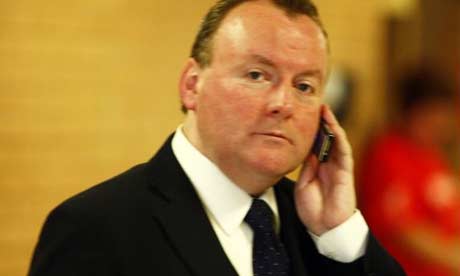Damian McBride promised that he’d never write a memoir, which I imagine is a relief to Ed Balls who now pretends he had little to do with “Mr McBride”. But now and again, the artist formally known as McPoison uses his blog to reminisce. His posts usually full of honesty and insight and today’s post is no exception. He has reflected on the “African coup”, when Tony Blair announced, without informing Brown, he would fight a third term.
His blog is worth reading in full. What jumps out at me is how Ed Balls is working hand in glove with McBride, even texting him orders after the Blair announcement: “You’ve got one job – Gordon and everyone around him needs to be totally disciplined about this. Total discipline.” McBride’s concern was how to break the news without Brown hitting the roof, in front of a plane full of journalists.
Gordon: “What’s in the news?” Me: “Hold on.” Gordon: “What’s wrong? What’s happening?” Me: “I need you to tell you something, but you can’t react. You’re being watched by Alex Brummer.” Gordon (agitated): “What is it?” Me: “You need to relax. Alex is watching to see if you’re angry or upset, so you need to calm down before I tell you.” When I relayed the news, his head started to sink, but he then put on his famous fixed grin for Alex’s benefit and started talking about where we would watch the weekend’s football matches. When we got to the convoy of cars and mini-buses to take us to the IMF building, GB disappeared into his limousine and I got on with the job of ‘ensuring total discipline’, telling all the officials and advisers with us that both we and Gordon would be under massive media scrutiny for the next 24 hours for evidence of anger or depression, so it was vital that no-one gave them any.
In the event, the Guardian’s Larry Elliot got a quote from a Brownite comparing Blair’s move to an “African coup”. McBride knew the quote was legit, and was dismayed: he’d been ordered (by Balls) to make sure they said nothing. Normally it worked, the Brown operation was not known for leaks. And why not? With striking honesty, McBride explains how this was partly down to the punishment he would personally mete out to random people whenever there actually was an authorised leak. He calls it his “Admiral Byng approach”.
“If anything did appear in the papers that was not from X, Y or Z, I would instantly name a culprit. I’d try and choose someone who was a decent suspect, but their guilt didn’t really matter – it was the assertion of their guilt that mattered. They would be cut out of meetings, removed from the circulation list for emails, and wherever they walked in the Treasury, people would mutter about their demise. The effect of this was to make the actual guilty party feel guilty as hell, and put the fear of God into everyone else in the Treasury about doing any leaking themselves. As for the poor Admiral Byngs, they’d usually recover after a while, and some of them were probably guilty anyway.”
A book about these kind of disclosures would be hugely useful and entertaining. This was how the Brown operation worked. I hold no brief for McBride, and was doing my best to expose his tricks long before he became notorious. But I always regarded him as a kind of flawed genius: he has an unrivalled memory for detail, stories, colour and analysis. The journalists whom he briefed were very lucky: ten minutes from McBride was all you needed. McBride clearly has lost none of these qualities: he is a natural for writing memoirs. He would not need a ghostwriter. Even when he sent me venomous emails denouncing me, they were always very well-written and often quote funny. No one has written a decent memoir of those 13 Labour years: Blair didn’t dare hire a ghost writer after that film, Mandelson rushed his. McBride’s memoirs, if they were candid, could still be the book that defines the era. And if he ever did, I’d straight to the index and look for “Balls, Ed”.







Comments